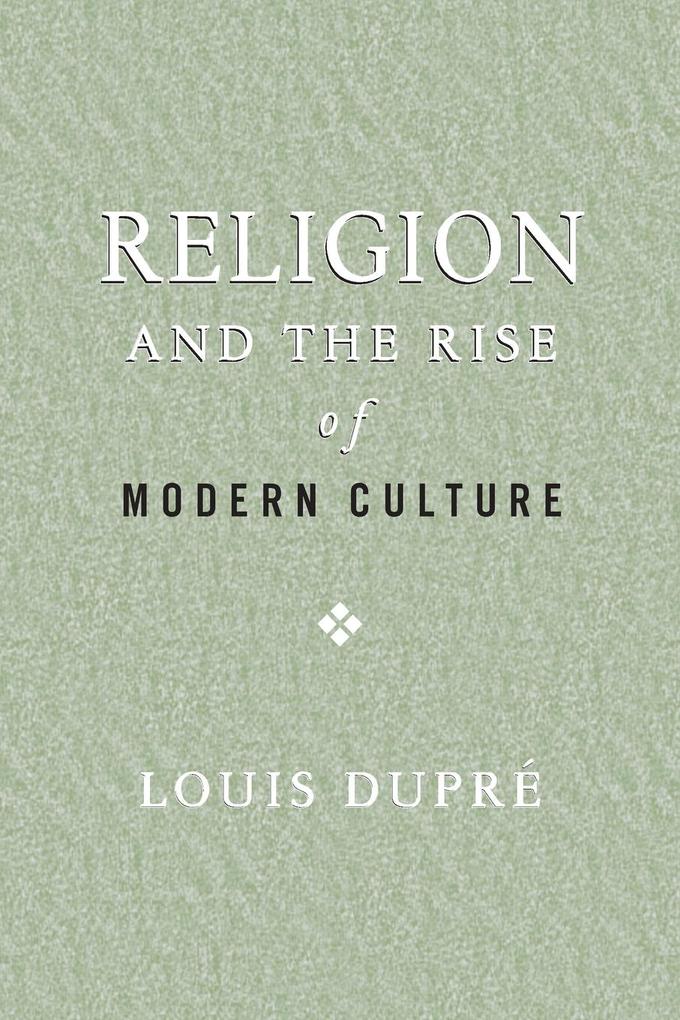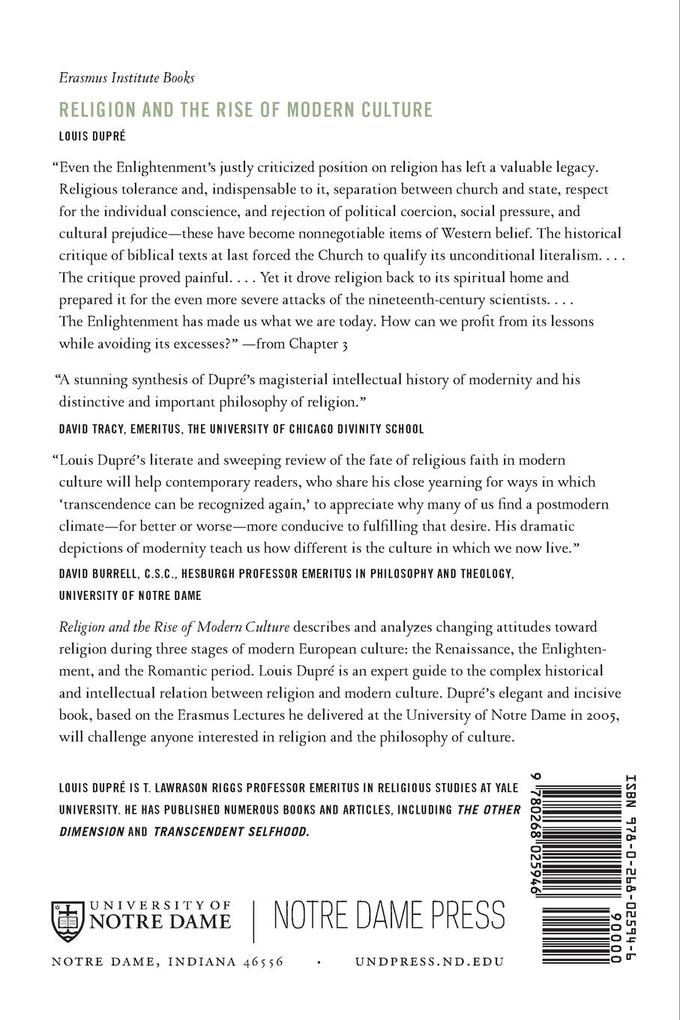
Zustellung: Fr, 06.06. - Mi, 11.06.
Versand in 6 Tagen
VersandkostenfreiBestellen & in Filiale abholen:
Religion and the Rise of Modern Culture describes and analyzes changing attitudes toward religion during three stages of modern European culture: the Renaissance, the Enlightenment, and the Romantic period. Louis Dupré is an expert guide to the complex historical and intellectual relation between religion and modern culture.
Dupré begins by tracing the weakening of the Christian synthesis. At the end of the Middle Ages intellectual attitudes toward religion began to change. Theology, once the dominant science that had integrated all others, lost its commanding position. After the French Revolution, religion once again played a role in intellectual life, but not as the dominant force. Religion became transformed by intellectual and moral principles conceived independently of faith. Dupré explores this new situation in three areas: the literature of Romanticism (illustrated by Goethe, Schiller, and Hölderlin); idealist philosophy (Schelling); and theology itself (Schleiermacher and Kierkegaard). Dupré argues that contemporary religion has not yet met the challenge presented by Romantic thought.
Dupré's elegant and incisive book, based on the Erasmus Lectures he delivered at the University of Notre Dame in 2005, will challenge anyone interested in religion and the philosophy of culture.
Dupré begins by tracing the weakening of the Christian synthesis. At the end of the Middle Ages intellectual attitudes toward religion began to change. Theology, once the dominant science that had integrated all others, lost its commanding position. After the French Revolution, religion once again played a role in intellectual life, but not as the dominant force. Religion became transformed by intellectual and moral principles conceived independently of faith. Dupré explores this new situation in three areas: the literature of Romanticism (illustrated by Goethe, Schiller, and Hölderlin); idealist philosophy (Schelling); and theology itself (Schleiermacher and Kierkegaard). Dupré argues that contemporary religion has not yet met the challenge presented by Romantic thought.
Dupré's elegant and incisive book, based on the Erasmus Lectures he delivered at the University of Notre Dame in 2005, will challenge anyone interested in religion and the philosophy of culture.
Inhaltsverzeichnis
Foreword by Peter Casarella
1. Philosophy and Faith
Part 1. Farewell to a Symbolic World
2. The Modern Idea of Culture and Its Opposition to Its Classical and Medieval Origins
3. The Fragmentation of the Symbolic World
4. The Sources of Modern Atheism
Part 2. Philosophical Reinterpretations of Theology
5. Hegel's Spirit and the Idea of God as Spirit
6. Philosophical Reflections on the Mystery of Creation
7. Evil and the Limits of Theodicy
8. Intimations of Immortality
Part 3. Phenomenology: Philosophy Reopens its Doors to Mystery
9. Phenomenology of Religion: Limits and Possibilities
10. Phenomenology and Religious Truth
11. The Enigma of Religious Art
12. Ritual: The Sacralization of Time
Part 4. Mysticism: The Silence of Faith
13. Is a Natural Desire of God Possible?
14. Mysticism and Philosophy
15. Justifying the Mystical Experience
1. Philosophy and Faith
Part 1. Farewell to a Symbolic World
2. The Modern Idea of Culture and Its Opposition to Its Classical and Medieval Origins
3. The Fragmentation of the Symbolic World
4. The Sources of Modern Atheism
Part 2. Philosophical Reinterpretations of Theology
5. Hegel's Spirit and the Idea of God as Spirit
6. Philosophical Reflections on the Mystery of Creation
7. Evil and the Limits of Theodicy
8. Intimations of Immortality
Part 3. Phenomenology: Philosophy Reopens its Doors to Mystery
9. Phenomenology of Religion: Limits and Possibilities
10. Phenomenology and Religious Truth
11. The Enigma of Religious Art
12. Ritual: The Sacralization of Time
Part 4. Mysticism: The Silence of Faith
13. Is a Natural Desire of God Possible?
14. Mysticism and Philosophy
15. Justifying the Mystical Experience
Produktdetails
Erscheinungsdatum
01. März 2008
Sprache
englisch
Seitenanzahl
132
Autor/Autorin
Louis Dupré
Verlag/Hersteller
Produktart
kartoniert
Gewicht
203 g
Größe (L/B/H)
229/152/8 mm
ISBN
9780268025946
Entdecken Sie mehr
Bewertungen
0 Bewertungen
Es wurden noch keine Bewertungen abgegeben. Schreiben Sie die erste Bewertung zu "Religion and the Rise of Modern Culture" und helfen Sie damit anderen bei der Kaufentscheidung.










